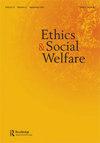“无论如何都是公开的”:匿名和知情同意在一项与可识别父母看护人的研究中的合作导航
IF 0.9
Q4 SOCIAL WORK
引用次数: 1
摘要
摘要:对于寻求具有特殊特征或环境的人的观点的定性研究人员来说,即使不是不可能,也很难满足对参与者匿名性的期望。在互联网通信和新兴研究方法的时代,传统策略需要不断的重新审查,以确保项目的伦理框架与其研究实践之间的一致性。本文对一项针对儿童有高水平支持需求的父母看护人的研究中使用的知情同意方法进行了反思。针对人们对这些父母因其高度个人化的情况而可能被重新确认身份的担忧,制定了两步书面同意程序。这种方法承认了识别的潜力,并最大限度地提高了参与者在选择他们能够适应的风险水平方面的能动性。本文讨论了研究人员和参与者对适应的同意程序的反应,并建议研究人员和伦理审查委员会对开发与文化和背景相关的合作和创新方法持开放态度,使人们能够贡献一些观点,否则这些观点可能会被旨在保护他们利益的道德框架所压制。本文章由计算机程序翻译,如有差异,请以英文原文为准。
‘It’s All Public Anyway’: A Collaborative Navigation of Anonymity and Informed Consent in a Study with Identifiable Parent Carers
ABSTRACT For qualitative researchers seeking the perspectives of people with unusual characteristics or circumstances, compliance with expectations about participant anonymity can be difficult, if not impossible. In the age of internet communications and emerging research methodologies, traditional strategies require ongoing re-examination to ensure cohesion between a project’s ethical framework and its research practice. This paper reflects on the approach to informed consent used in a study with parent carers whose children had high-level support needs. A two-step process of written consent was developed in response to concerns about the possible re-identification of these parents as a result of their highly individual circumstances. This approach acknowledged the potential for identification, and maximised participants’ agency in choosing the level of risk that they were comfortable to accommodate. The paper discusses the researcher’s and participants’ responses to the adapted consent process and recommends that researchers and ethics review committees remain open to the development of collaborative and innovative approaches that are also culturally and contextually relevant, to enable people to contribute perspectives that might otherwise be silenced by the very ethical frameworks that purport to protect their interests.
求助全文
通过发布文献求助,成功后即可免费获取论文全文。
去求助
来源期刊

Ethics and Social Welfare
SOCIAL WORK-
CiteScore
1.60
自引率
20.00%
发文量
36
期刊介绍:
Ethics and Social Welfare publishes articles of a critical and reflective nature concerned with the ethical issues surrounding social welfare practice and policy. It has a particular focus on social work (including practice with individuals, families and small groups), social care, youth and community work and related professions. The aim of the journal is to encourage dialogue and debate across social, intercultural and international boundaries on the serious ethical issues relating to professional interventions into social life. Through this we hope to contribute towards deepening understandings and further ethical practice in the field of social welfare. The journal welcomes material in a variety of formats, including high quality peer-reviewed academic papers, reflections, debates and commentaries on policy and practice, book reviews and review articles. We actively encourage a diverse range of contributions from academic and field practitioners, voluntary workers, service users, carers and people bringing the perspectives of oppressed groups. Contributions might include reports on research studies on the influence of values and ethics in social welfare practice, education and organisational structures, theoretical papers discussing the evolution of social welfare values and ethics, linked to contemporary philosophical, social and ethical thought, accounts of ethical issues, problems and dilemmas in practice, and reflections on the ethics and values of policy and organisational development. The journal aims for the highest standards in its published material. All material submitted to the journal is subject to a process of assessment and evaluation through the Editors and through peer review.
 求助内容:
求助内容: 应助结果提醒方式:
应助结果提醒方式:


